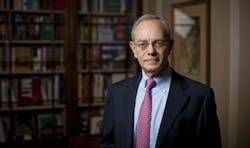MIT President Says Immigrant Travel Ban Will Hurt US Economy
If higher education is under attack from restrictive U.S. immigration policies, the president of the Massachusetts Institute of Technology considers it a personal battle.
Rafael Reif, an immigrant from Venezuela, has emerged as a vocal critic of President Donald Trump in the past year, initially responding to the White House travel ban targeting Muslim-majority countries. Reif, 67, has spoken out more recently against a tax overhaul that includes a levy on endowments of large, private colleges.
“What happens, thanks to these immigrants, are places like MIT help the American economy -- that has to be understood,” Reif said in a wide-ranging interview to air Wednesday on Bloomberg TV. “The whole nation will hurt with this perception that we are not as welcoming as we used to be.”
Biotech Center
MIT has become the center of a booming biotech economy in Cambridge, Mass.
Graduates have started more than 30,000 companies that generate $2 trillion of revenue annually, he said.
Last year, the university completed a $750 million deal with the federal government to purchase a 14-acre tract in Kendall Square that will be transformed to support even more startups, Reif said.
MIT filed seven amicus briefs last year opposing the travel ban, which the U.S. Supreme Court allowed to take effect last month. Travel to the U.S is restricted from eight countries, including Venezuela. The university also filed a brief in support of a court challenge to Trump’s decision to end the Deferred Action for Childhood Arrivals program, which protected undocumented immigrants from deportation if they were brought to the U.S. as children.
Reif, who moved to the U.S. to attend Stanford University in 1974, said he believes the policies will harm the ability of top schools like MIT to attract the best students from around the world. Foreigners make up more than 40% of graduate students at MIT.
“When you hurt MIT, you hurt the country,” he said. “The world is competitive and there are opportunities elsewhere.”
Reif, who was promoted to president from provost in 2012, called the endowment tax a “budget cut” for the country’s wealthier schools that represents “a very big misunderstanding” of what higher education does for the economy. The 1.4% levy on net investment income at nonprofit universities with more than 500 students and more than $500,000 of endowment-per-student applies to MIT and a few dozen other colleges.
MIT will pay an estimated $10 million a year based on the endowment’s average investment returns over the past five years, school officials said.
“I don’t think they want to be at war,” he said of Republicans who backed the levy on wealthy schools. “It sounds to me that they just don’t understand our role.”
By Michael McDonald and Tom Moroney
About the Author
Bloomberg
Licensed content from Bloomberg, copyright 2016.
